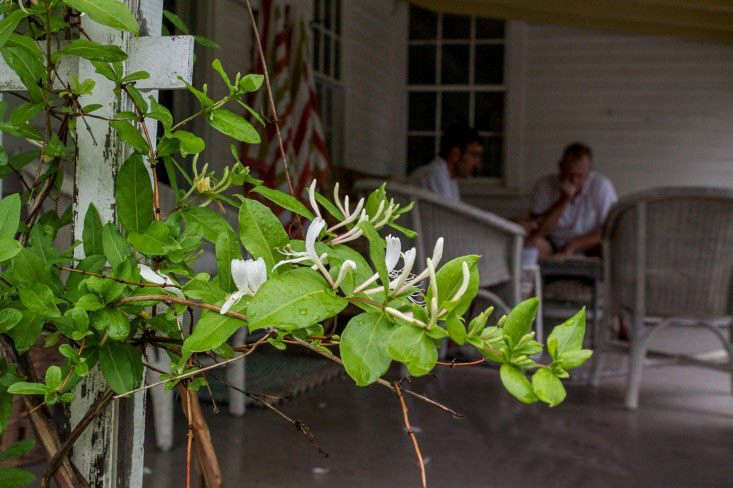When my husband and I lived in Manhattan we’d often question, as we beat our way through endless traffic on the Merritt, why we bothered to make the four- or more frequently seven-hour trip to Cape Cod. Finally arriving some time after dark, we’d open the car doors to be greeted by an intoxicating wave of sea air mixed with honeysuckle and roses. There and then, before we even caught a glimpse of the sun dancing on the water, the stress of city life melted away, and in less than a New York minute the trip all became worth it.
Today, even though our journey from Boston is a good deal shorter, the pure magic of that cocktail of beach cottage aromas never wanes. This time of year, when the New Dawn roses that climb the porch are at their finest, I like to harvest them along with honeysuckle and grapevines. I created an homage to Cape Cod for the inside of the house, so the salubrious fragrance follows me wherever I go.
See below for step-by-step instructions for a DIY arrangement with climbing roses.
Photography by Justine Hand.

Above: My rose-covered cottage in June, when blooming New Dawn roses and honeysuckle frame the porch door.
Above: A rugged Cape Codder: though most rose are finicky about Cape Cod’s sandy soil and salty air, this hearty climber seems to love the less-than-ideal growing conditions here. (For more, see 10 Easy Pieces: Perennials for the Seaside Garden.) Organically grown New Dawn Roses are available at Stargazer Perennials; $19.89.

Above: For me, the sweet smell of honeysuckle is synonymous with the Cape. Even though it’s an invasive species, I can’t bare to remove the four plants that wind their way up the trellises of our porch. In my defense, I will note that this honeysuckle has been here since the 1960s, so was not planted by me. In fact, you can’t get Japanese honeysuckle in nurseries any more. When one died, I replaced it with a non-invasive alternative: Lonicera x heckrottii Gold Flame, which is a similarly fragrant, climbing honeysuckle and available at White Flower Farm; $28.95.
Above: The inspiration for my bouquet is the way New Dawn roses and honeysuckle intertwine above the door of my cottage.
Above: Another feature of a Cape Cod landscape: grapes often grow wild by the shore. Here an unknown cultivar grows on the arbor near my children’s play house.
Above: For the DIY arrangement, I cut long stems of each of the roses, honeysuckle, and grapevines. (Thick gloves are highly recommended when handling roses.) For a vase, I picked my grandmother’s old pitcher. An “ole Cape Codder,” my grandmother is responsible for instilling in me a love of flowers. I also employed her vintage frog useful for anchoring the long heavy stems of this sizable bouquet.
Shopping for an old-fashioned flower frog? See our favorites at Vintage-Style Flower Frogs.
 Above: I absolutely love the expressive form of grapes, with their leggy stems, broad leaves, and grasping tendrils. Sometimes I will simply place a single cutting in a long vase. But after they’re cut, grapes tend to wilt rather quickly. To prolong their shelf life, I either use a knife to make a long diagonal slice to expose the center of the stem, or I smash them with a hammer.
Above: I absolutely love the expressive form of grapes, with their leggy stems, broad leaves, and grasping tendrils. Sometimes I will simply place a single cutting in a long vase. But after they’re cut, grapes tend to wilt rather quickly. To prolong their shelf life, I either use a knife to make a long diagonal slice to expose the center of the stem, or I smash them with a hammer.
For more tips on smashing stems to prolong the life of cut flowers, see DIY: Hydrangeas Gone Wild.
Step-by-Step Instructions
Step 1: Make a base with the long grapes. I like to use one stem that brushes the table on one side, by a bushier sample placed a bit higher on the opposite side.
Above: While wearing gloves, prep your rose stems in the same manner as the grapes, with a long cut. I also like to remove the thorns because they catch on other stems, which can disrupt the whole arrangement if you attempt to move them.
Step 2: Focusing on the center of the composition, place an abundant grouping of roses. But you also don’t want to lose informality of the New Dawn, so don’t pack them too tight.
Step 3: Finish off your bouquet with a few strategically placed pieces of honeysuckle. Structurally, these demure flowers add a sense of height and airiness to the arrangement. Their bits of yellow also complement the sunny center of the roses. Not to mention (again) that smell.
Above: That’s it. My finished bouquet has an abundant but wild aspect that captures the rugged beauty of the Cape.
Above: A detail of the bouquet shows that expressive power can be achieved with a very simple palette.

Above: In this detail of the lower part of the arrangement, you may note that I didn’t try to tame the drooping forms of the grapes and roses, but rather let them inform the structure of the bouquet.

Above: Now my cottage smells as sweet inside as it does out.
N. B. Take a walk on the wild side with these other foraged arrangements:
Finally, get more ideas on how to successfully plant, grow, and care for rose with our Rose: A Field Guide.
Finally, get more ideas on how to plant, grow, and care for various perennial plants with our Perennials: A Field Guide.























Have a Question or Comment About This Post?
Join the conversation (0)